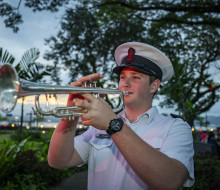
Taupō trumpeter in demand in brand new career with Royal New Zealand Navy Band
26 August 2025
Unfortunately you are viewing this website on an outdated browser which does not support the necessary features for us to provide an adequate experience. Please switch to a modern browser such as latest version of Google Chrome, Mozilla Firefox, Apple Safari or Microsoft Edge.
Ngā mihi nui
Royal New Zealand Navy musician Natalie Paine always remembered the “heck, yeah, why not” from her recruit instructor when she asked if musicians could get a posting to Antarctica.
Now, after four years of applying, she’s finally on the ice – and probably the first New Zealand Defence Force (NZDF) musician to get there.
Leading Musician Paine, who was born in Adelaide but now lives in Auckland’s Bayswater, is among the 21 NZDF personnel who live and breathe the Antarctic environment for five months while deployed to New Zealand’s Scott Base and the nearby United States’ McMurdo Station.
“I have loved Antarctica since I was a little girl watching David Attenborough documentaries,” she said. “I had this idea of becoming a scientist and doing research in Antarctica one day.”
However, she pursued music over science, studying classical performance on the French horn at tertiary level before joining the Navy Band in 2019.
She had thought working in Antarctica was out of reach. But during her Navy training, she read about the NZDF’s 70-year Operation Antarctica history and quizzed her recruit instructor, who told her anyone could apply.
“I got very excited and decided I was going to be the Navy musician who went to Antarctica. The dream was re-ignited.”
I got very excited and decided I was going to be the Navy musician who went to Antarctica. The dream was re-ignited.
Leading Musician Natalie Paine

As far as she is aware, it is the first time a NZDF musician has deployed on Op Antarctica.
Leading Musician Paine works as a communications operator at Scott Base, staffing the communications room and monitoring all radios, telephone, satellite phone, email and various other forms of communication.
It’s a 24/7 watchkeeper role, which she shares with three other personnel. Other tasks include checking in on all personnel working in the field to ensure everyone is safe and well and conducting security rounds of the base.
Keeping up her musical “chops” is important. She needed to find a way to maintain the strength and fitness of her playing muscles, as well as the dexterity, flexibility and coordination the French horn demands.
She was hesitant about taking an expensive and delicate instrument to the ice. She needed an alternative that was cheap, easy to maintain and wouldn’t matter if it got damaged.
“I found a plastic instrument that is designed for children,” she said. “It has the same length piping as a single B-flat French horn. It doesn’t have the tone and range of the full double horn, but it does mean I can still play my routine exercises and melodies using mostly the same finger patterns.
“And being plastic instead of metal, my hands won’t freeze to it.”
Scott Base was delighted to have a professional musician on hand for the Changing of the Flag ceremony, marking the official handover from the winter team to the summer crew.
Normally the music is a recorded track but Leading Musician Paine – armed with a supplied trumpet – stepped up.
“It was a really special opportunity to add value as a musician by delivering a live performance. I can now say I have performed solo in -21 degrees.”
She said she felt “phenomenally blessed” to have her career aspirations come true. Her advice to others wanting to visit Antarctica was not to doubt yourself, and that good things take time.
“Be persistent, proactive and patient – and if not successful initially, don’t give up. Seek ways to meet any gaps in your training so that nothing can hold you back when the time is right.
“I am thankful to the RNZN Band for supporting me to take this out-of-branch posting. I feel so incredibly humbled and honoured to be able to represent my trade in this way.”